1789

Pierce Butler, born in County Carlow, Ireland but later of Prince William's Parish (in present day Beaufort County), and South Carolina native Ralph Izard were elected as the state's first United States senators at a joint session of the South Carolina legislature.
1789
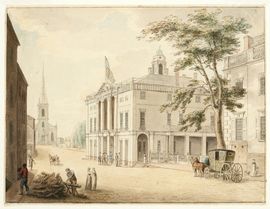
The first meeting of the Senate was held at Federal Hall in New York City. Only eight senators were present, an insufficient number to constitute a quorum. The Senate finally achieved its first quorum of 12 members, out of the eligible 22, on April 6, 1789.
1789
The Senate drew lots to determine the three classes of senators. Ralph Izard was assigned the Class 3 seat (with a six year term to expire in 1795) and Pierce Butler was assigned the Class 2 seat (with a four year term to expire in 1793).
1789
Vice President John Adams administered the oath to support the Constitution to all senators present, including Ralph Izard.
1789
Pierce Butler presented his credentials and took his seat, after which Vice President John Adams administered the oath to support the Constitution.
1797

The Senate elected Jacob Read, born in Christ Church Parish, near Charleston, as its president pro tempore.
1810

The Senate elected John Gaillard of Charleston as its president pro tempore. Over the course of his four terms in office (1804–1826), Gaillard was elected to the position ten more times.
1819

Senator William Smith of Yorkville, Pinckneyville, and later Charleston, became chairman of the Committee on the Judiciary, serving until 1823.
1825
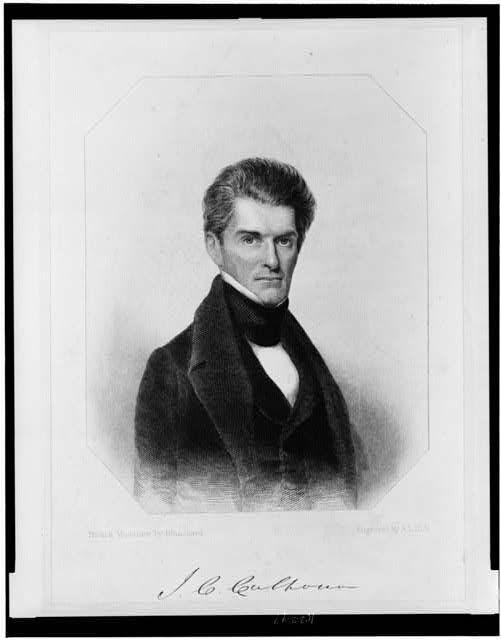
John Caldwell Calhoun took his oath of office and presided over the Senate as the seventh vice president of the United States. Calhoun, of Fort Hill, served as vice president under both President John Quincy Adams and President Andrew Jackson.
1826
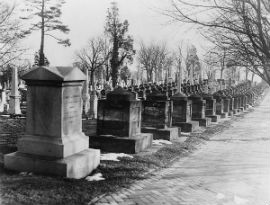
Two days after his death, funeral services for John Gaillard were held in the Senate Chamber. Besides fellow senators, those in attendance included the president, the vice president, members of the House of Representatives, and the justices of the Supreme Court. Gaillard was interred in Congressional Cemetery, Washington, DC, and in 1827 the Senate paid $170 for a tombstone.
1830
_webster_l.jpg)
Over the course of two days, January 21, and January 25, 1830, Robert Young Hayne of Charleston delivered one of the Senate's classic speeches, a reply to an address the day before by Massachusetts senator Daniel Webster. Hayne also was the brother of future South Carolina senator Arthur Peronneau Hayne, who served in 1858.
1832

John C. Calhoun of Fort Hill was elected to the Senate to fill the vacancy caused by the resignation of Robert Y. Hayne. Serving as vice president of the United States at the time of his election, Calhoun resigned his executive office, becoming the first vice president to do so. On January 4, 1833, he took his Senate oath. Calhoun later resigned his Senate seat in 1843 to begin an unsuccessful run for the Democratic Party nomination as president.
1841

Senator William Campbell Preston became chairman of the Committee on Military Affairs (today's Committee on Armed Services), serving until 1842.
1845
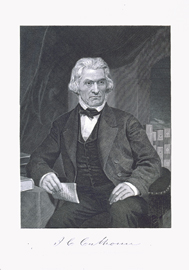
Senator John C. Calhoun became chairman of the Committee on Finance, serving until 1846.
1846

Senator George McDuffie, of Edgefield and later Cherry Hill, became chairman of the Committee on Foreign Relations, serving until his resignation in August.
1848
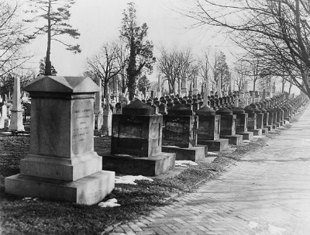
Andrew Pickens Butler of Edgefield became chairman of the Committee on the Judiciary, serving until 1857. Butler, uncle to future South Carolina senator Matthew Calbraith Butler (1877–1895), died in office on May 25, 1857. A cenotaph memorializing Butler was placed at Congressional Cemetery in Washington, DC.
1850
Senator John C. Calhoun died. Two days later, his funeral service was held in the Senate Chamber.
1850

Franklin Harper Elmore of Columbia was appointed to fill the vacancy caused by the death of John C. Calhoun. Elmore's Senate term was due to expire on March 3, 1853, but he died in office on May 29, 1850, having served less than two months. Elmore's funeral was held in the Senate Chamber on May 31, 1850.
1856
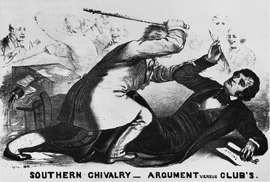
The Senate had recently adjourned when South Carolina representative Preston Brooks entered the Senate Chamber and approached Massachusetts senator Charles Sumner, who was seated at his desk. Two days earlier Sumner had delivered a scathing speech, "The Crime Against Kansas," in which he made negative references about Brook's uncle, South Carolina senator Andrew Pickens Butler, and Brooks now sought revenge. Brooks struck his cane repeatedly on Sumner's head and neck, so hard that the cane smashed into pieces.
1857
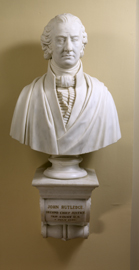
An act was passed authorizing the Joint Committee on the Library to contract an artist to execute a marble bust of former chief justice John Rutledge for placement in the Old Supreme Court Chamber.
1858

In a speech comparing the relative strengths of the North and the South in any conflict, South Carolina senator James H. Hammond of Beech Island famously declared, "No, you dare not make war on cotton. No power on earth dares to make war upon it. Cotton is king."
1860

Senator James Chesnut Jr. of Kershaw became the first member of Congress to withdraw on the eve of the Civil War.
1861
The Senate voted to expel South Carolina senator James Chesnut, Jr., along with nine other southern senators. The term of the state's other senator, James H. Hammond, had expired on March 3, 1861, and no replacement had been named.
1868
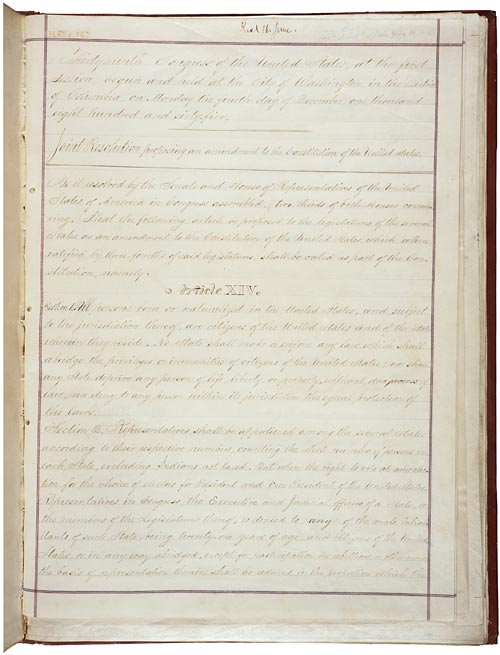
Congress passed an act to admit the states of North Carolina, South Carolina, Louisiana, Georgia, Alabama, and Florida, to representation in Congress. The statute was enacted over President Andrew Johnson's veto and conditioned admission to representation in Congress with ratification of the Fourteenth Amendment.
1868
South Carolina was readmitted to representation in Congress.
1868

Thomas James Robertson of Columbia was elected to fill the vacancy in the Class 2 Senate term that began on March 4, 1865. The next day, Frederick Adolphus Sawyer of Charleston was elected to fill the vacancy in the Class 3 Senate term that began on March 4, 1867. Both men presented their credentials and took the oath of office on July 22.
1870

Senator Frederick A. Sawyer became chairman of the Committee on Education and Labor (today's Committee on Health, Education, Labor, and Pensions), serving until 1873. Two years later, on December 9, 1875, John James Patterson of Columbia became chairman of the same committee, serving until 1877.
1877

The Senate voted 29 to 28 (with Vice President William Wheeler breaking the tie) to seat Matthew Calbraith Butler of Edgefield after rival state legislatures had elected different candidates for the same seat. Butler had been a Confederate general during the Civil War and lost his right foot at the Battle of Brandy Station in 1863. Butler was a nephew of former South Carolina senator Andrew Pickens Butler (1846–1857).
1881
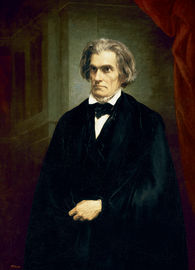
A painting of John C. Calhoun (1782–1850) by Henry F. Darby was purchased by the Joint Committee on the Library.
1886
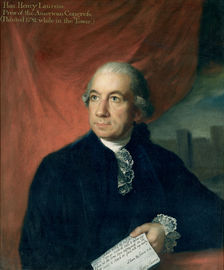
A portrait of South Carolina patriot and statesman Henry Laurens (1724–1792) by Lemuel Francis Abbott was purchased by the Joint Committee on the Library.
1893
Senator Matthew C. Butler became chairman of the Committee on Interstate Commerce (today's Committee on Commerce, Science, and Transportation), serving until 1895.
1896
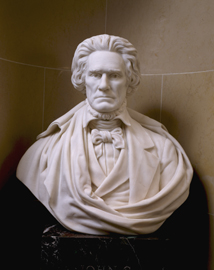
A marble bust of Vice President John C. Calhoun (1782–1850) by South Carolina-born artist Theodore Mills was added to the Senate's Vice Presidential Bust Collection and placed in the Senate Chamber gallery.
1899
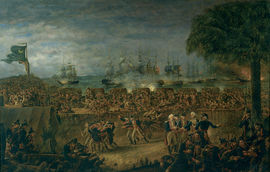
The Joint Committee on the Library accepted three paintings by South Carolina artist John Blake White (1781–1859): Sergeants Jasper and Newton Rescuing American Prisoners from the British; General Marion Inviting a British Officer to Share His Meal; and Mrs. Motte Directing Generals Marion and Lee Burn Her Mansion to Dislodge the British. Two years later the Committee accepted a fourth painting by White, The Battle of Fort Moultrie. All four paintings were placed in the west side of the third floor of the Capitol extension.
1902

During a Senate debate, Benjamin Ryan Tillman of Trenton, South Carolina, and John Lowndes McLaurin of Bennettsville, exchanged blows over accusations of political treachery and slander. A week later, by a vote of 54 to 12, the Senate censured Tillman and McLaurin and suspended them for six days.
1910
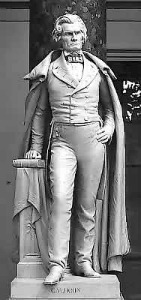
The Senate moved to accept a marble statue of John C. Calhoun (1782–1850) by Frederic W. Ruckstull for placement in the Capitol's National Statuary Hall Collection.
1913
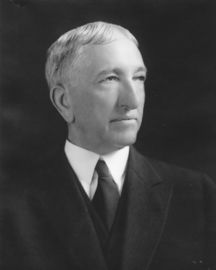
James Marion Baker of South Carolina was elected the 11th secretary of the Senate and served until May 19, 1919. During Baker's tenure the Senate strengthened its floor procedures, created the posts of party whips, and established the cloture rule. Baker also presided over the Senate one time, on December 6, 1915.
1913

The Senate Democratic caucus denied Senator Benjamin R. Tillman chairmanship of the Committee on Appropriations, even though he had seniority over other members. The 66-year-old Tillman, an 18-year veteran of the Senate, was denied the position because of his failing health, but the caucus did make him chairman of the Naval Affairs Committee.
1914
The Senate adopted a rule forbidding smoking on the floor of the Senate because Senator Benjamin R. Tillman, recovering from a stroke, found the smoke irritating.
1914
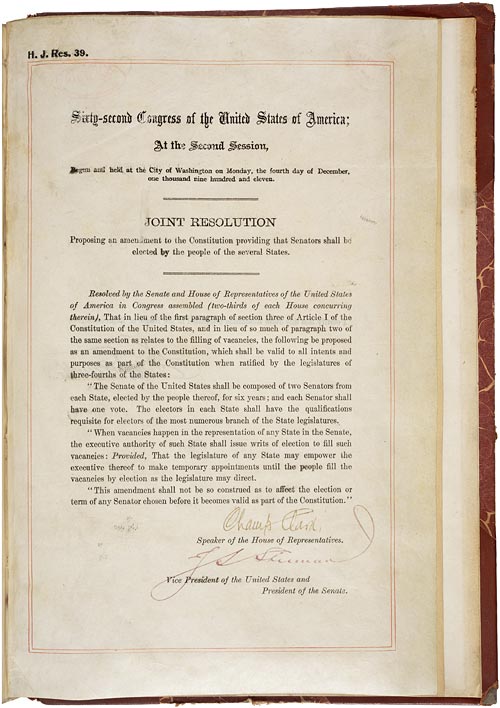
Incumbent senator Ellison DuRant Smith of Florence, first elected in 1908, became South Carolina's first directly elected senator under the terms of the Seventeenth Amendment.
1918

Senator Ellison DuRant Smith became chairman of the Committee on Interstate Commerce (today's Committee on Commerce, Science, and Transportation) and served and in that position until 1919. Smith chaired that committee again from 1924 to 1925.
1924
For the first time, a minority-party senator won election as chairman of a major committee over the majority party's determined opposition. At stake was leadership of the powerful Senate Interstate Commerce Committee (today's Committee on Commerce, Science, and Transportation). After 32 ballots, Progressive Republicans tipped the balance by casting their votes for Democrat Ellison DuRant Smith.
1929
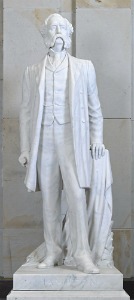
The Senate moved to accept a marble statue of South Carolina senator Wade Hampton (1818–1902) by Frederic W. Ruckstull for placement in the Capitol's National Statuary Hall Collection.
1933
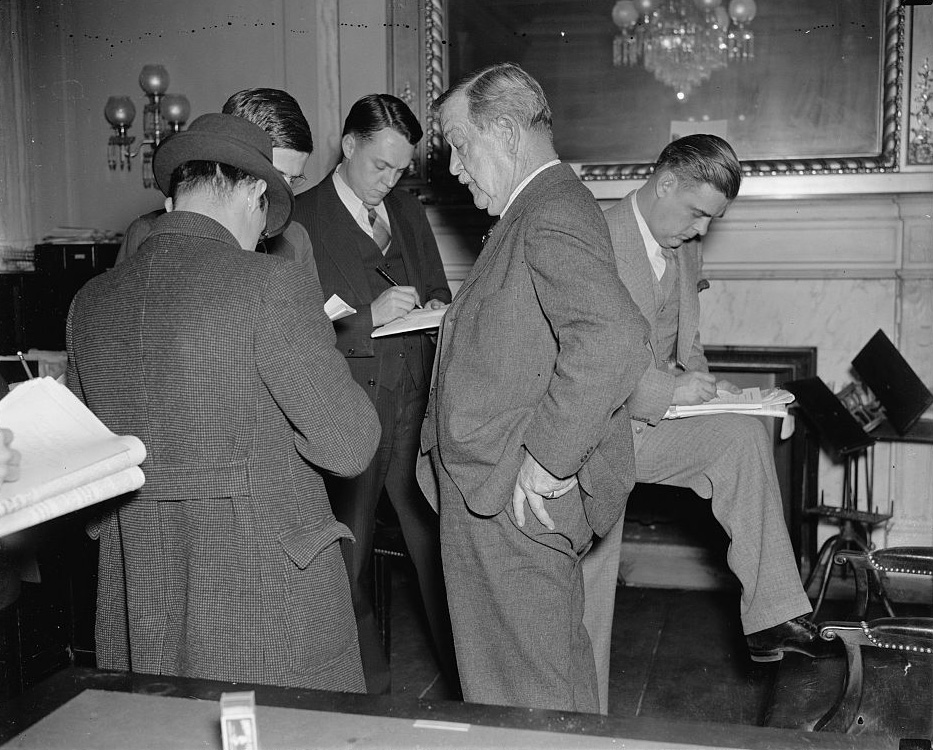
Senator Ellison DuRant Smith, popularly known as "Cotton Ed" for his support of that crop, became chairman of the Committee on Agriculture and Forestry (today's Committee on Agriculture, Nutrition, and Forestry) and served in that position until his death in office on November 17, 1944.
1941

Alva Moore Lumpkin of Columbia took his seat in the Senate. Lumpkin was appointed to replace James F. Byrnes but served just 16 days before his death on August 1.
1949

Senator Burnet Rhett Maybank of Charleston became chairman of the Committee on Banking and Currency (today's Committee on Banking, Housing, and Urban Affairs), serving until 1953.
1954

James Strom Thurmond of Aiken became the first person ever elected to the Senate as a write-in candidate.During his campaign, Thurmond had pledged that if elected, he would resign prior to the 1956 primary so that voters, rather than the party executive committee, could make that crucial choice. True to his word, Senator Thurmond resigned in April 1956. He won that primary and the November general election.
1956

Nineteen southern senators, including South Carolina's Olin DeWitt Talmadge Johnston and Strom Thurmond, signed the Declaration of Constitutional Principles, known as the Southern Manifesto, in opposition to the Supreme Court's 1954 ruling in Brown v. Board of Education. Members read its entire text into the Congressional Record.
1957
Over the course of two days, August 28th and 29th, Senator Strom Thurmond set the record for longest Senate speech when he filibustered the 1957 Civil Rights Act for 24 hours, 18 minutes. That record was broken in 2025 by Senator Cory Booker of New Jersey, who spoke for 25 hours, 4 minutes.
1959
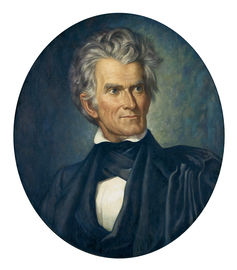
A portrait of Senator John C. Calhoun (1782–1850) by Arthur E. Schmalz Conrad was unveiled in the Senate Reception Room (S-213). The work was one of five commissioned to commemorate former outstanding senators. The portraits were placed in oval medallions on the walls left vacant when Constantino Brumidi painted the room in the mid-19th century.
1963
The Senate Committee on Rules and Administration, chaired by North Carolina senator Benjamin Everett Jordan, began an 18-month investigation into alleged conflicts of interest and financial improprieties by South Carolina-born Bobby Baker, Democratic Party secretary and confidant of former Senate majority leader Lyndon B. Johnson. Although Baker had resigned on October 7, the information revealed in the hearings encouraged the Senate to adopt a formal ethics code.
1964
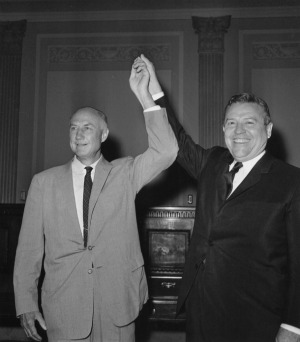
Senators Strom Thurmond and Ralph W. Yarborough of Texas engaged in a wrestling match outside the Commerce Committee hearing room. Thurmond was attempting to prevent the formation of a quorum to report on the nomination of former Florida governor LeRoy Collins to the newly established Community Relations Service.
1964
Senator Strom Thurmond changed his party affiliation from Democratic to Republican.
1966

Ernest Frederick (Fritz) Hollings of Charleston was elected to complete the unexpired term of Olin DeWitt Talmadge Johnston, who died on April 18, 1965. Reelected to five full terms, Fritz Hollings and fellow South Carolinian senator Strom Thurmond served together for 36 years, 1 month, and 16 days, the longest time any state has been represented by the same two senators.
1967
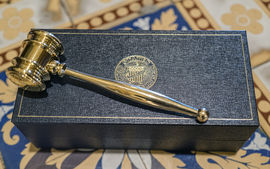
Senator Fritz Hollings received a Golden Gavel Award for presiding over the Senate for 100 hours in a single session.
1980
Senator Fritz Hollings became chairman of the Committee on the Budget, serving until 1981.
1981
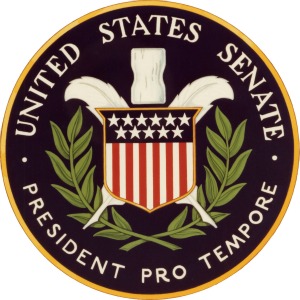
The Senate elected Strom Thurmond as its president pro tempore. Between 1981 and 1997 Thurmond was elected president pro tem three more times (1985, 1995, 1997).
1981
Senator Strom Thurmond became chairman of the Committee on the Judiciary, serving until 1987.
1987
Senator Fritz Hollings became chairman of the Committee on Commerce, Science, and Transportation, serving until 1995. In 2001 Hollings again chaired the committee, serving until 2003.
1993
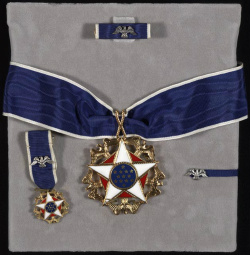
Senator Strom Thurmond received the Presidential Medal of Freedom, given by the president of the United States to honor individuals who have made great contributions to either the United States or the world. To date, 28 senators have received the award.
1995
Senator Strom Thurmond became chairman of the Committee on Armed Services, serving until 1999.
1996
Senator Strom Thurmond became the oldest person ever to serve in the Senate, at 93 years and 94 days, exceeding the record of Rhode Island's Theodore F. Green, set on January 3, 1961. Thurmond also became the oldest incumbent senator reelected to office.
1997
With his ninth swearing-in ceremony, Senator Strom Thurmond set a record for the number of times an individual has taken the oath of office as a United States senator. Robert C. Byrd of West Virginia tied Thurmond's record on January 4, 2007. Senator Daniel Inouye of Hawaii tied the record on January 5, 2011.
1997
Senator Strom Thurmond became the Senate's longest-serving member with a service of 41 years, 10 months. He went on to serve a total of 47 years, 5 month, and 17 days. On June 12, 2006, Senator Robert Byrd of West Virginia surpassed Thrumond's record, and upon his death in 2010, became the longest-serving senator in Senate history. He now ranks as the 4th longest-serving senator, behind Senator Daniel Inouye of Hawaii and Patrick Leahy of Vermont .
1997
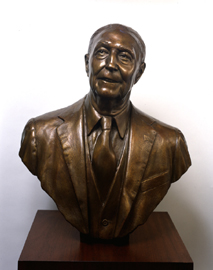
A bronze bust of Senator Strom Thurmond by Frederick E. Hart was accepted by the United States Senate Commission on Art and placed in the Strom Thurmond Room (S-238) in the Capitol.
2001

In a single resolution, the Senate elected both Robert C. Byrd of West Virginia and Senator Strom Thurmond¡ presidents pro tempore. Because Democrats controlled the Senate from January 3 to January 20, 2001, Senator Byrd served during that period. When the Republicans regained control of the Senate starting January 20, 2001, Thurmond assumed the office of president pro tempore.
2001

Following the party change of James Jeffords of Vermont from Republican to Independent, the Democrats gained control of the Senate and Robert C. Byrd became president pro tem. The Senate then adopted S. Res. 103 designating Senator Strom Thurmond as the Senate's first president pro tempore emeritus.
2002
Senator Strom Thurmond became the first (and to date, only) member of the Senate to reach the age of 100.
2004

Lindsey O. Graham of Seneca received a Golden Gavel Award for presiding over the Senate for 100 hours in a single session.
2006

James DeMint of Greenville received a Golden Gavel Award for presiding over the Senate for 100 hours in a single session.
2013

Tim Scott of Charleston became South Carolina's first African American senator, and the seventh African American to serve in the Senate, when he was appointed to replace Jim DeMint. Scott represented South Carolina in the House of Representatives from Jan. 3, 2011, to Jan. 2, 2013.
2019

Lindsey O. Graham became chairman of the Senate Committee on the Judiciary, a position he held until 2021.
2025
Lindsey O. Graham became chairman of the Senate Committee on the Budget. Tim Scott became chairman of the Senate Committee on Banking, Housing, and Urban Affairs.